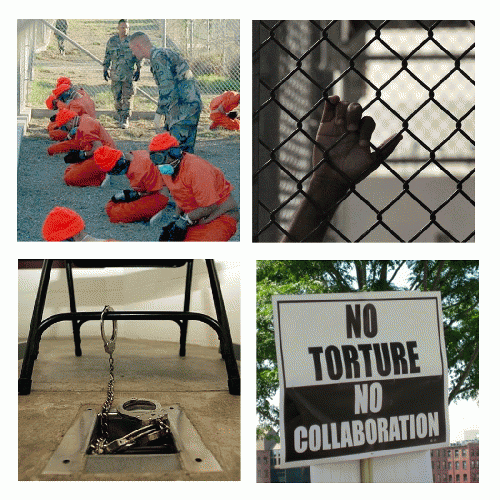This essay was co-authored by Trudy Bond. It first appeared on Truthout.
After seven years the American Psychological Association recently decided to close an ethics case against a Guantanamo psychologist without taking disciplinary action. This is not merely an isolated story about a single individual's reprieve from accountability. Rather, the case of Dr. John Leso illuminates in full measure the APA's disturbing post-9/11 decision to embrace the burgeoning U.S. "war on terror" national security agenda at the expense of our profession's do-no-harm ethical principles.
Shortly after the terrorists hit their targets on the morning of September 11, 2001, the American Psychological Association took action. Within hours, it mobilized a broad network of expert practitioners to offer psychological support to the families of victims and to rescue workers. But the APA also worked quickly to ensure that the Bush Administration viewed the world's largest organization of psychologists as a valued partner in the rapid expansion of military and intelligence operations. High-level efforts were devoted to nurturing relationships with the Department of Defense, the CIA, and other government agencies. The APA aimed to position psychology and behavioral scientists as key players in U.S. counter-terrorism and counter-intelligence activities.
These overtures were the prelude to placing Dr. Leso and other psychologists on the front lines in the development and implementation of brutal detention and interrogation techniques. Dr. Leso was sent to Guantanamo within months of the arrival of the first detainees, where he led a new "Behavioral Science Consultation Team." Numerous detailed and authoritative documents -- a U.S. Senate report on detainee treatment, a leaked interrogation log, an Army investigative report, previously classified meeting memoranda, and recent reports from The Constitution Project and the Institute on Medicine as a Profession -- all clearly implicate him in designing and participating in abusive and torturous interrogations at Guantanamo, including that of Mohammed al Qahtani. Over a two-month period Mr. al Qahtani was subjected to almost daily 20-hour interrogations, strict isolation, and sleep deprivation. He was frequently hooded, terrorized by military dogs, forced to stand naked with female interrogators present, forced to wear a woman's bra with a thong placed on his head, led around by a leash, forced to perform dog tricks, and violated by other forms of abuse.
It was not until late 2004 that early Red Cross concerns over psychological coercion at Guantanamo "tantamount to torture" first became public. In the interim the APA had aggressively promoted psychology's contributions to national security challenges, lobbied for greater funding for psychological research in this arena, and with generous CIA funding co-sponsored invitation-only workshops examining deception and interrogation, among other topics. When the news of alleged detainee abuses broke, the APA immediately sought to put out the fires of controversy by creating a task force comprised primarily of individuals who were directly or indirectly employed by the U.S. military or intelligence community. At least three members of this task force knew Dr. Leso personally and had some knowledge of his Guantanamo activities.
Not surprisingly given its composition, the task force quickly concluded that it was indeed ethical for psychologists to serve as consultants to interrogations and in related national security roles. Their report on "Psychological Ethics and National Security" (PENS) endorsed the Department of Defense's official view that psychologists played a valuable role in ensuring that detention and interrogation operations were safe, legal, ethical, and effective. It also prioritized the Bush Administration's contorted interpretations of U.S. law over longstanding and broadly respected principles of international human rights law and professional ethics.The APA's board of directors approved the report from the PENS task force in an "emergency" session, bypassing the standard review process by the Association's governing council.
In the years following the PENS report, the APA issued formal resolutions condemning torture and vowed to take decisive action against psychologists who committed ethical violations. But at the same time, the APA's ethics director extolled psychologists' "unique competencies" in interrogation settings and the Pentagon officially took steps to rely more heavily on psychologists as other U.S. health organizations refused to participate on ethical grounds. More broadly, the APA sought to expand the opportunities for psychologists in national security operations, even though aspects of these activities -- including their classified nature -- would inevitably pose serious challenges for professional ethics and oversight.
The ethics complaint against Dr. Leso was filed (by one of us, Trudy Bond) almost seven years ago. From that point forward, the subsequent release of additional government documents, investigative reports, and sworn testimony has only added to the compelling evidence of wrongdoing. That is why the news in late January that the APA's ethics office had closed the case without sanctions was greeted with such dismay and outrage by other psychological organizations and groups within and outside of the APA. These concerns were not soothed by APA's explanations that Dr. Leso was early in his career, that he had not requested his Guantanamo assignment, that he felt pressured by superiors to develop the brutal techniques, and that he expressed reservations about the abusive techniques. None of those considerations justified a psychologist's participation in cruel, inhuman, and degrading treatment.
Two weeks ago the APA's board of directors offered its own defense of how the Leso complaint was handled. Although their statement was aimed at quelling the controversy, it may well have the opposite effect. It is now clear that the ethics committee was never given the opportunity to review and resolve the case -- the case was closed before that step was even reached. Equally troubling, the ethics office relied on information provided by unnamed individuals with "access to classified material" who found "no evidence of wrongdoing and affirmative evidence of safeguarding detainees." In light of the anonymity of these sources, questions arise as to whether these unnamed individuals were involved in operations at Guantanamo, whether they supervised Dr. Leso, and whether they were free from any potential conflicts of interest. Once again, the handling of the complaint against Dr. Leso demonstrates the APA's now routine reliance on and deference to military and intelligence interests in determining our profession's priorities and interpreting our ethical principles.
As psychologists ourselves, we are deeply distressed by the involvement of health professionals in torture and abuse, and by key choices the American Psychological Association has made over the past twelve years. Though most psychologists are far removed from the interrogation booths at Guantanamo, the measure of a profession is the full range of roles and activities it encourages or allows. It is imperative that we live up to the public's perception of us as ethically grounded practitioners and scientists with expertise in human behavior and a deep respect for human dignity. When psychologists betray this trust, they cause harm not only to their direct victims but also to the profession as a whole. Just as importantly, when unethical acts are committed with impunity they lend a veil of legitimacy to forms of mistreatment that diminish and jeopardize our society's fabric of decency.
It is with these considerations in mind, and as we look to the future, that we wonder whether the profound tragedy of Guantanamo might have been diminished if psychologists stationed there had held fast to our profession's do no harm principles and refused to countenance human rights abuses, and if psychology's leadership had done the same.






